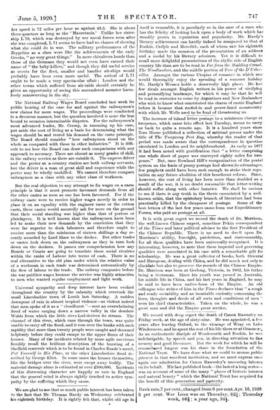The National Railway Wages Board concluded last week its public
hearing of the case for and against the railwaymen's new claims for more wages. The proceedings were conducted in a decorous manner, but the question involved is none the less bound to occasion interminable disputes. For the railwaymen's most advanced leader, Mr. Cramp, in summing up his case, put aside the cost of living as a basis for determining what the wages should be and rested his demand on the caste principle. The Board should consider " how railwaymen stood on the whole as compared with those in other industries." It is diffi- cult to see how the Board can draw such comparisons with any approach to accuracy. There are almost as many grades of skill, in the railway service as there are outside it. The express driver and the porter at a country station are both railway servants, but the driver is a man of great skill and experience while the porter may be wholly unskilled. We cannot therefore compare railwaymen as a class with any other class of workmen.


































 Previous page
Previous page